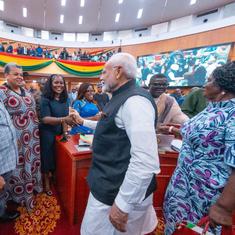'To make criminals of dissidents, that is the process you are fighting': at JNU, P Sainath asks students to stay united
The journalist is a former student of the Jawaharlal Nehru University.
P Sainath, a former student of Jawaharlal Nehru University, is one of the handful of journalists in the country who bring up in mainstream media issues of inequality and injustice in rural India in particular.
In a speech on Friday on the university campus, Sainath condemned the arrest of Kanhaiya Kumar, terming it, "criminalisation of dissent". Saying that crushing of dissent has existed in India's countryside for two decades, he asserted that it has now made its way into college campuses as well.
"This isn't just an infraction or violation of the Constitution or law, it is to make criminals of dissidents, that is the process you are fighting", he says. Citing the people's movement against mining companies in Orissa, he adds, "You live in the period of not only the greatest inequality but in the period of collapse of restraint on corporate power."
In an impromptu lecture on fundamentalism and inequality in India, Sainath covers the widespread inequalities in wealth. While the number of billionaires, and the number of MPs who by their own admission are crorepatis, has increased, India continues to fare badly on the world's Human Development Index when it comes to the number of people going hungry, and the meagre average household salaries of primary breadwinners in rural households, which is locked at an average of Rs 5000 per month.
"India is ruled by socio-religious fundamentalists in alliance with economic market fundamentalists – the two need each other desperately, they are locked in an embrace."
Quoting Arun Shourie, Sainath agrees with his succinct description of the current government as "Congress plus cow".
In his hour-long address, Sainath touches upon the plight of farmers, and the miserable figures for education in India. As he point out, even as life has become easier for those in the middle class, it has steadily become more difficult for the poor.
Calling the JNU students to stay united in the face of the current crises, he says, "A fraternity whose ideological forebearers murdered the father of the nation want to talk to you about being anti-national. People whose leaders begged for mercy from the British to be released from prison on the condition they would be good boys are teaching you about being nationalist."
"JNU was always a place of diversity, of multiple voices, and should be, but what was fantastic to me in this last week or two weeks is the way everyone of differing ideologies has risen above themselves to put forward a united front against the nastiest state in the last ten years. Do not lose that unity".









